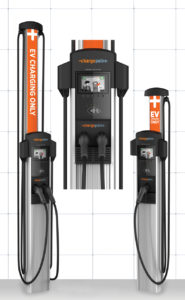NATIONAL REPORT—Drive around the parking lot at the local mall or train station, and you’re likely to find parking spots designated for electric vehicles, often in prime positions. EV charging stations are becoming commonplace throughout the United States, as drivers switch over to vehicles that are more efficient and better for the environment. But should your hotel offer EV charging stations for guests?
According to the second annual electric mobility report, “Charging Forward” from ChargePoint, a company that has a network of charging stations worldwide, by 2040, 54% of new car sales and 33% of the global fleet will be electric.
“We are in the midst of the tipping point in a revolution in transportation,” said Michael Jones, VP of sales at ChargePoint. “Electric vehicles have significantly increased in popularity in recent years, and market research indicates that EVs are on a trajectory toward mass adoption within the next few decades.”
In 2017, the U.S. EV market reached historic milestones, Jones said: With more than 41 models available, annual sales reached nearly 200,000 units for the first time ever. By 2020, more than one million electric vehicles will have been sold in the U.S.
“With at least 30 new EV models in nearly every category coming out over the next several years, consumers will have more choice than ever before, encouraging even broader EV adoption,” Jones said.
With an ever-increasing number of potential guests looking for places to charge up when they park, what does that mean for hotels? “Charging stations are important to address a few changes in our industry: First, there is a focus on attracting the growing number of drivers who are increasingly moving to electric vehicles,” Jones said. “The shift to electric mobility is happening across the board in a number of industries, so it’s important to prepare your brand for that shift. Providing access to charging for electric vehicles is a great way to appeal to the growing market of EV drivers. Second, there is a rise in demand for ‘value-oriented’ select-service hotels. These bridge the gap between full luxury and economy-style hotels by providing specialized amenities, like charging, that are essential to meet the needs of EV owners. Third, renovations at properties are at an all-time high, affording great opportunities to incorporate EV charging into larger projects to reduce overall capital costs.”
Jones noted that hoteliers do currently face challenges when it comes to implementing EV charging stations—namely a lack of knowledge about vendor options, the high cost of capital to retrofit and the interruption to business operations that comes with construction—but there are also plenty of benefits.
“By offering charging solutions, hoteliers provide an essential amenity for EV drivers, which will in turn foster brand loyalty and create repeat customers,” he said.
When investigating a solution, Jones said, it’s important for a hotelier to ask three questions: What value can you bring to my property? How do you ensure my customers have a great experience? Do you have references or case studies that provide evidence of the benefits of offering EV charging?
Jones noted that certain states do tend to have more EV stations currently. “EVs tend to be most popular in states with legislation in place to encourage the transition to e-mobility, such as California, Texas, Washington and others that offer incentives for EV drivers,” he said. “In many of these states, new EV purchases and registrations are growing faster than new infrastructure development. Businesses that choose to meet this demand with investments in charging infrastructure can benefit from first mover advantage.”
Top 10 states for EV driver growth include Utah, Oklahoma, Vermont, Colorado, Idaho, Nevada, New Hampshire, Missouri, Arizona and Massachusetts.
“While these states play a vital role in the e-mobility revolution, the adoption of EVs is spreading across the nation, and we only expect the expansion to accelerate as more EVs come onto the market and charging infrastructure expands,” Jones said. “We anticipate that our network will grow rapidly across every state in the U.S. as the popularity of EVs continues to increase and the world moves closer toward the mass adoption of electrification.” HB
Hoteliers weigh in
NATIONAL REPORT—Should hoteliers think about adding charging stations? Executives from companies that have been involved in Tesla’s Destination Charging Program give their take.
“Marcus Hotels & Resorts was among one of the first operators to introduce Tesla charging stations,” said Steve Magnuson, managing director of the Grand Geneva Resort & Spa in Lake Geneva, WI, which is owned and managed by Marcus Hotels & Resorts. “We are always finding new ways to enhance our guests’ overall experience, and back at that time, we saw more and more Tesla cars arriving on property and we felt this would be a welcome amenity.”
21c Museum Hotels has charging stations at its Bentonville, AR; Louisville, KY; and Cincinnati properties. GM Emmanuel Gardinier noted that when it launched in 2013, 21c Bentonville joined the Tesla Destination Charging Program. “Electric car owners are very much on the forefront of technology and design, and they are very receptive to the 21c experience,” he said.
Magnuson said this type of solution is right for upper-scale properties and resorts. “Driving a luxury car deserves a luxury experience,” he said.
Jamie Sabatier, CEO of Two Roads Hospitality—which is also part of Tesla’s program with more than half of all Destination hotels across the country participating—added, “This solution works for an array of properties throughout the country—for both urban and resort product.”
“Nowadays, all hotels should think about offering some type of charging station—the electric car is here to stay,” Gardinier said. “More and more car brands are putting full electric or chargeable hybrids on the market, and offering a charging station is becoming a must.”
Feedback has been positive. “Our guests really like the fact we offer this service at no charge to them,” Magnuson said. “Since we are a destination resort, it’s an added amenity that guests consider when making their final decision.”
“We regularly receive positive reviews from incoming visitors that use the charging stations—whether it’s simply to dine at our restaurants or guests staying overnight,” Sabatier agreed. “New this year as part of the Tesla Lifestyle Program, a number of our properties will be providing benefits, in the form of discounted or complimentary services, experiences, goods or access, to Tesla owners visiting charging locations.”
Magnuson said, “I think it’s going to move from an amenity to an expectation.”
Gardinier added, “Electric car chargers are quickly becoming ubiquitous. You can already travel coast to coast with an electric car, so properties that do not offer that service will be left behind in the near future.”


